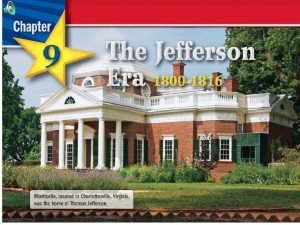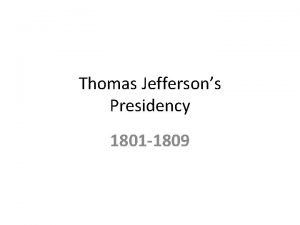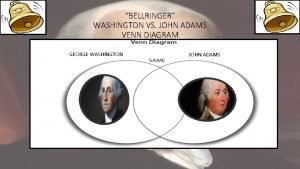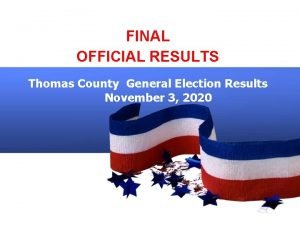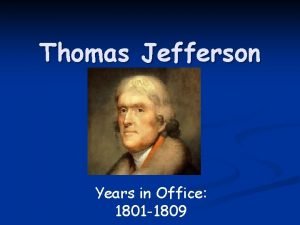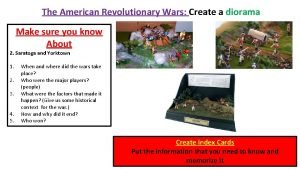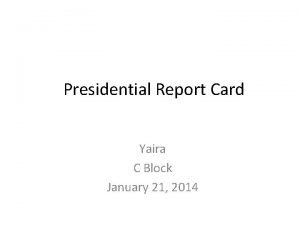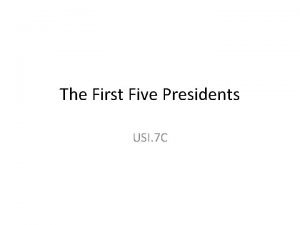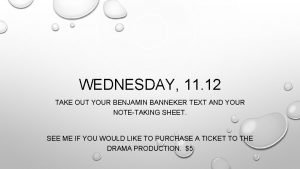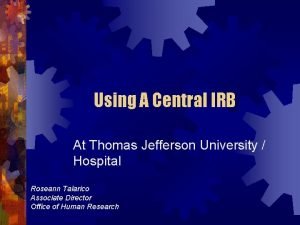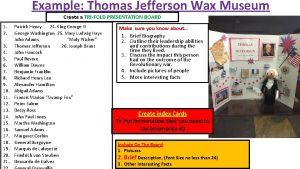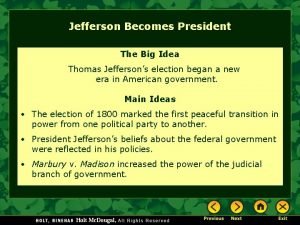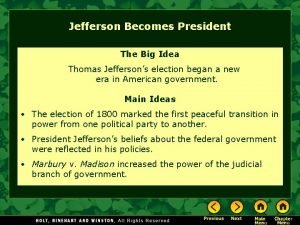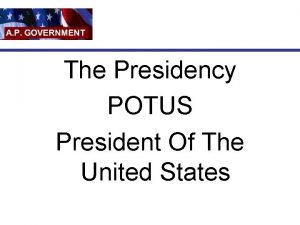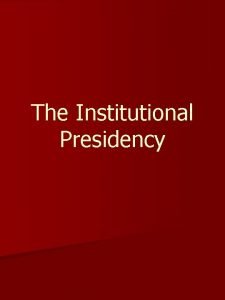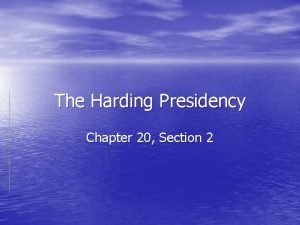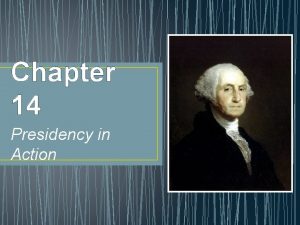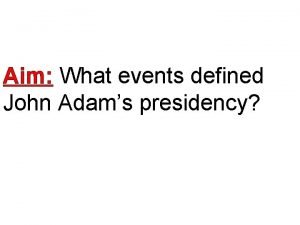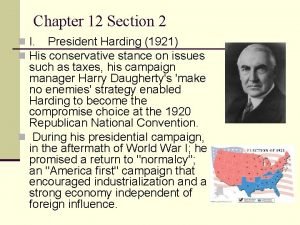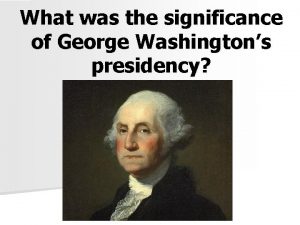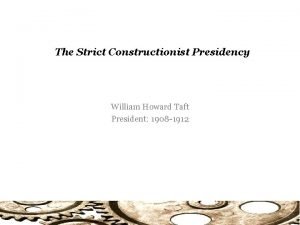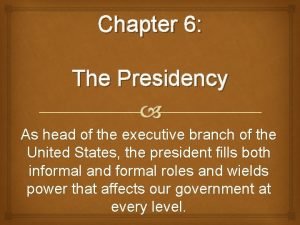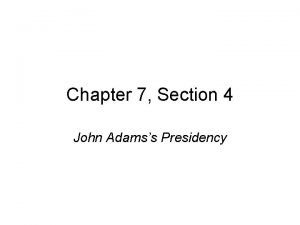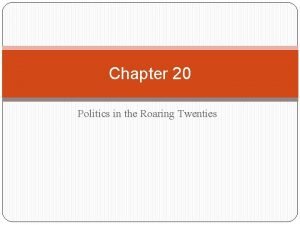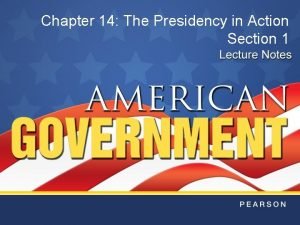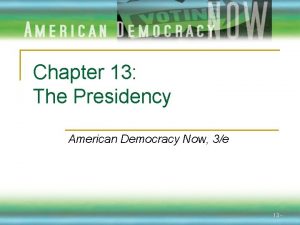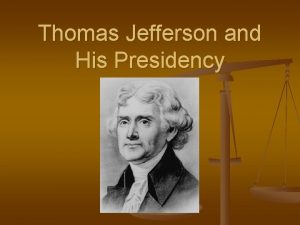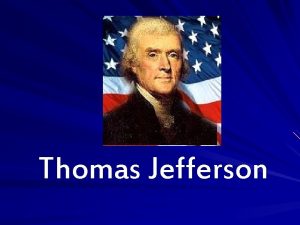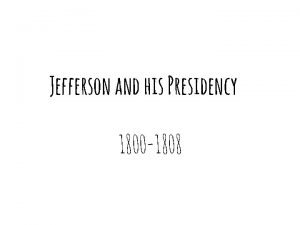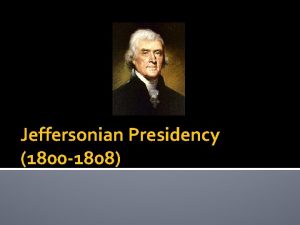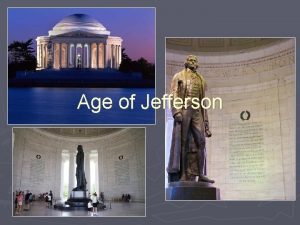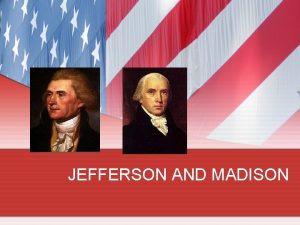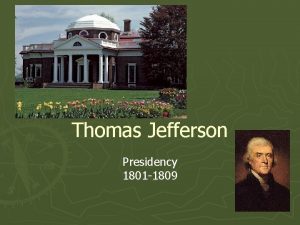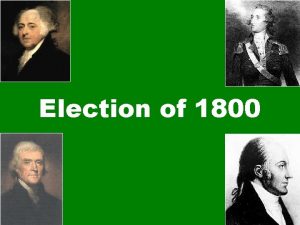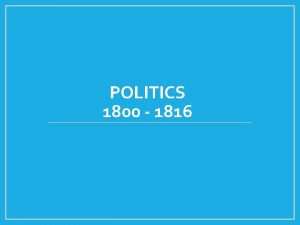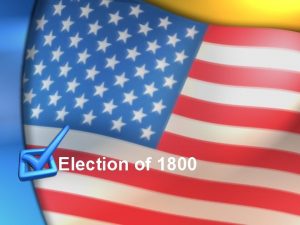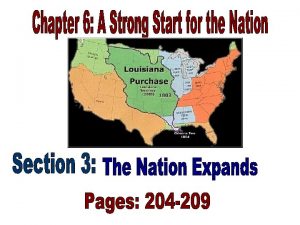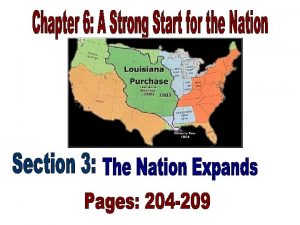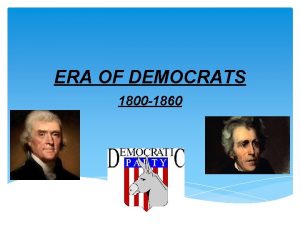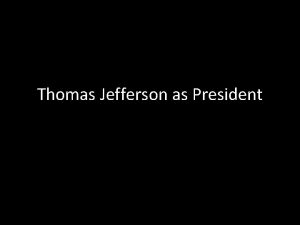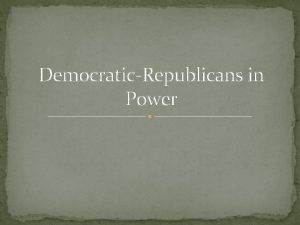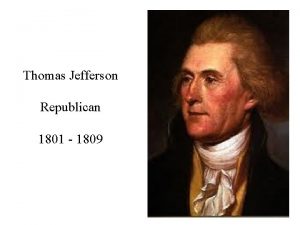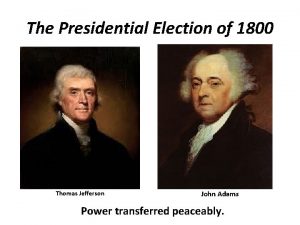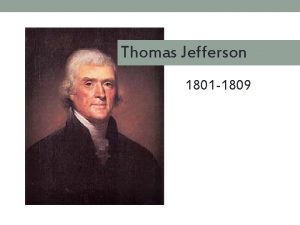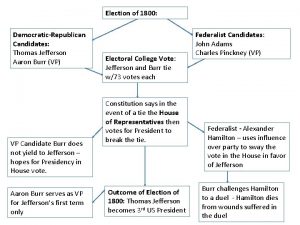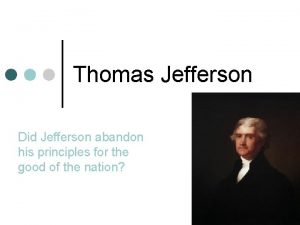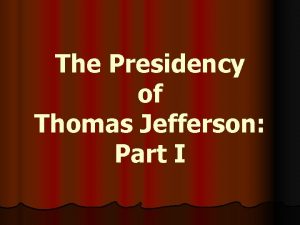Thomas Jefferson and His Presidency Election of 1800

































- Slides: 33

Thomas Jefferson and His Presidency

Election of 1800 n n Thomas Jefferson & Aaron Burr both tie with 73 votes. It goes to the House. Thomas Jefferson became our 3 rd president The Twelfth Amendment was added to the Constitution n Pres and VP run as a ticket

Election of 1800 n Changes made by Jefferson Alien and Sedition Acts repealed (Why? ) n Lowered Government Expenses, Cut Taxes n Increased the power of Agricultural in the South. n Free Trade w/o Government Control n

Document A: Alexander Hamilton (Modified) The purchase of New Orleans is essential to the peace and prosperity of our Western country, and opens a free and valuable market to our commercial states. This purchase will probably make it seem like Mr. Jefferson is brilliant. Any man, however, who possesses any amount of intelligence, will easily see that the purchase is the result of lucky coincidences and unexpected circumstances and not the result of any wise or thoughtful actions on the part of Jefferson’s administration. As to the vast region west of the Mississippi, it is a wilderness with numerous tribes of Indians. And when we consider the present territory of the United States, and that not one-sixteenth is yet under occupation, the possibility that this new purchase will be a place of actual settlement seems unlikely. If our own citizens do eventually settle this new land, it would weaken our country and central government. On the whole, we can honestly say that this purchase is at best extremely problematic. Source: Alexander Hamilton wrote an editorial called “Purchase of Louisiana” for the New York Evening Post, July 1803.

Document B: Letters by Federalists (Modified) Rufus King to Timothy Pickering, November 4, 1803 According to the Constitution, Congress may admit new states. But can the President sign treaties forcing Congress to do so? According to the Louisiana Treaty, the territory must be formed into states and admitted into the Union. Will Congress be allowed to set any rules for their admission? Since slavery is legal and exists in Louisiana, and the treaty states that we must protect the property of the inhabitants, won’t we be forced to admit the new states as slave states? Doing so will worsen the problem of unequal representation from slave and free states. Timothy Pickering to Rufus King. March 4, 1804 I am disgusted with the men who now rule us. The coward at the head [Jefferson] is like a French revolutionary. While he talks about humanity, he enjoys the utter destruction of his opponents. We have too long witnessed his general wickedness —his cruel removals of faithful officers and the substitution of corruption and immorality for honesty. Source: The two letters above are written between two Federalists. Rufus King was a Senator from New York and Timothy Pickering was a Senator from Massachusetts.

Louisiana Purchase n Jefferson’s purchase of Louisiana had its origins in his desire to n n Give the United States control over the Mississippi River Acquire a port to provide an outlet for western crops Hoped to preserve an agricultural (agrarian) society by making abundant lands available to future generations To prevent war with France over control of the Louisiana Territory and secure American commerce

Marbury Vs. Madison (1803) n n William Marbury – A Supreme court judge appointed by Adams on his last night of Office. Jefferson ordered the Secretary of state (James Madison) not to deliver the official papers to Marbury the next day. Marbury Sued Madison over this matter. What does the Supreme court do? Does Marbury win? Take a guess in your notes!

Marbury Vs. Madison Continued n n n Supreme court rules against Marbury! Why? Jefferson was going to ignore the appointment & therefore ignore the supreme court. So…The Supreme Court protects their power keeping judicial review. Judicial Review- Gives the SC the power to decide which laws are Constitutional. Now Write in your own words!

Hamilton Vs. Burr n n Duel (1804) When two gentleman cannot settle an argument and ones honor is in question they use pistols to settled it. Hamilton Supported Burr’s Opponent in the New York Governors race. Burr Challenges Hamilton and Kills him. Hamilton Never fires a shot.

Hamilton vs. Burr


JEFFERSON WANTS NEW ORLEANS n JEFFERSON SENDS JAMES MONROE & ROBERT LIVINGSTON TO PARIS. n THEY ARE TO BUY NEW ORLEANS - CAN PAY AS MUCH AS $10 MILLION

Louisiana Purchase n April 30, 1803 n n Robert Livingston & James Monroe signed the Louisiana Purchase Treaty in Paris The United States paid $15 million for the land, roughly 4 cents per acre The purchase added 828, 000 square miles of land west of the Mississippi to the United States July 4 the Louisiana Purchase is publicly announced Original treaty can be found at: http: //www. archives. gov/exhibits/american_o riginals_iv/sections/louisiana_purchase_treaty. html

MORE… n IF THE FRENCH REFUSE, MONROE IS TO FORM AN ALLIANCE WITH BRITAIN AGAINST FRANCE.

Maps of the Louisiana Purchase The original maps can be found at: http: //www. washington. edu/uwired/outreach/cspn/hstaa 432/lesson_4/louisiana. html

JEFFERSON’S PRINCIPLES GET IN THE WAY. JEFFERSON IS A STRICT CONSTRUCTIONIST. n MUST USE IMPLIED POWERS TO JUSTIFY THE DEAL. n FEDERALIST ATTACK JEFFERSON FOR STRETCHING THE CONSTITUTION. n


Lewis and Clark Expedition n January 18, 1803 n n n Jefferson asks Congress for funds to explore the land west of the Mississippi His goal is to find a water route to the Pacific May 1804 n Meriwether Lewis and William Clark depart on the expedition Map of Lewis and Clark’s Route Original map can be found at: http: //www. pbs. org/lewisandclark/archive/maptrack_b. html

Lewis and Clark Expedition n January 18, 1803 n n Jefferson sends a secret message to congress regarding the Lewis and Clark Expedition In this message Jefferson asks for permission to establish trading with the Indians

LEWIS AND CLARK EXPEDITION 1804 -1806 ASCEND THE MISSOURI RIVER AND CROSS TO THE PACIFIC n SURVEY THE AREA AND ESTABLISH RELATIONS WITH THE INDIANS n

Embargo Act 1807 Forbade export of all goods from U. S. n n n Jefferson got Congress to hastily pass the act Reasoned that a U. S. embargo would force Britain & France to respect its rights. Loose construction of the Constitution n n Congress' power to "regulate commerce" meant it could stop exports. Undermined Jefferson’s states’ rights philosophy Embargo Act was a disaster to the U. S. economy. Why? We need foreign business more than they do. Non Intercourse Act (ended Embargo Act) n n Formally reopened trade with all nations of the world except France and Britain Remained U. S. policy until War of 1812.

JEFFERSON VS THE PASHA OF TRIPOLI n n n JEFFERSON OPPOSED LARGE ARMIES AND NAVIES A THREAT TO THE GOVERNMENT n Barbary Pirates take bribe money from US ships so that they don’t take their cargo. n Pirates demands increase n Jefferson won’t pay them, and tries to over through the gov’t of Tripoli but does not succeed. n Jefferson realizes that with out a real military our nation is at risk. AND EXPENSIVE n Because of the failed gov’t over through we pay $60, 000 in ransom.

Evaluating Jefferson Positives n n n Negatives • Contradicts his own interpretation of Expands the size of the constitution. United States. “Louisiana ~ Why? for the good of the country Purchase” Keeps US out of a costly war Preserves neutrality

JEFFERSON’S NAVAL POLICY LEADS TO WEAKNESS. n JEFFS ARE TOO SMALL TO BE USEFUL n WHEN THE WAR OF 1812 COMES WE MUST BUILD REAL SHIPS TO CONTEND WITH THE BRITISH.

1801 PASHA DECLARES WAR ON U. S. n n HOW WOULD JEFFERSON RESPOND? SENDS MARINES TO THE “SHORES OF TRIPOLI” 1805 WAR ENDS - WE PAY $60, 000 IN RANSOM. BUT SHOWED WE WOULD FIGHT.

MORE… n 2500 MEN IN THE ARMY n BUILT “JEFFS” TO DEFEND THE COAST. SMALL BOATS W 1 GUN.

Louisiana Purchase cont’ n n n Bought the land from Napoleon $15 million As a strict constructionist, the Constitution did not authorize the President to negotiate treaties incorporating huge new expanses of land into the union.

THE LOUISIANA PURCHASE n IN 1800 NAPOLEON GAINS CONTROL OF NEW ORLEANS FROM SPAIN. n WITHDRAWS THE RIGHT OF DEPOSIT IN 1802

NAPOLEON OFFERS TO SELL ALL OF LOUISIANA n n n PRICE $15 MILLION DOLLARS FOR ALL THE LAND BETWEEN THE MISSISSIPPI & THE ROCKY MTS. LIVINGSTON SIGNS THE DEAL APRIL 30, 1803 828, 000 SQ MILES (3 CENTS AN ACRE.

Louisiana Yet Again n Jefferson reluctantly submitted the treaties to the Senate while privately admitting the purchase as unconstitutional. n n n Senate promptly ratified the treaty Land-hungry Americans jubilantly supported the purchase Federalist opposition (typical of "loyal opposition" up to the present) n n n Ironically argued for strict construction: President did not have power to purchase LA. Ironically claimed LA would cost too much especially when balancing budget was a goal Real reason: worried that western lands would be loyal to Jefferson’s Republicans. .

Jefferson’s Legacy n n Expansion became prime goal Creation of a democratic non-aristocratic government Total defeat of Federalists by 1816 Jefferson kept the country out of a damaging European war n War of 1812 not until late in Madison’s first term.

CONSEQUENCES OF THE DEAL DOUBLED THE SIZE OF THE UNITED STATES. n GAINED A RICH RIVER VALLEY n SECURED NEW ORLEANS AND THE MISSISSIPPI RIVER. n JEFFERSON CALLED IT “THE VALLEY OF DEMOCRACY. ” n

THE LOUISIANA PURCHASE IS JEFFERSON’S GREATEST ACHIEVEMENT AS PRESIDENT.
 Apush chapter 7 hammering out a federal republic
Apush chapter 7 hammering out a federal republic The election of 1800 showed that
The election of 1800 showed that Thomas jeffersons presidency
Thomas jeffersons presidency Venn diagram ghent
Venn diagram ghent Thomas county election results
Thomas county election results Thomas jefferson resume
Thomas jefferson resume Thomas jefferson child hood
Thomas jefferson child hood What was thomas jefferson foreign policy
What was thomas jefferson foreign policy Bottle buddies project
Bottle buddies project Thomas jefferson report card
Thomas jefferson report card John adams acrostic poem
John adams acrostic poem Thomas jefferson domestic policy
Thomas jefferson domestic policy Benjamin banneker letter to thomas jefferson annotation
Benjamin banneker letter to thomas jefferson annotation Jefferson irb
Jefferson irb Thomas jefferson wax figure
Thomas jefferson wax figure Thomas jefferson
Thomas jefferson Thomas jefferson big idea
Thomas jefferson big idea Thomas jefferson big idea
Thomas jefferson big idea Forensic pathologist vs forensic anthropologist
Forensic pathologist vs forensic anthropologist Presidency line of succession
Presidency line of succession Institutional presidency definition
Institutional presidency definition Chapter 20 section 2 the harding presidency
Chapter 20 section 2 the harding presidency President appointment power
President appointment power Xyz affair summary
Xyz affair summary Washingtons presidency
Washingtons presidency Chapter 6 section 1 the presidency
Chapter 6 section 1 the presidency Ch 12 section 2 the harding presidency
Ch 12 section 2 the harding presidency Lesson quiz 9-1 the federalist era
Lesson quiz 9-1 the federalist era Constructionist theory president
Constructionist theory president President formal and informal powers
President formal and informal powers Section 4 the presidency of john adams
Section 4 the presidency of john adams Chapter 20 politics of the roaring twenties
Chapter 20 politics of the roaring twenties Chapter 14 the presidency in action
Chapter 14 the presidency in action American democracy now 5th edition
American democracy now 5th edition

